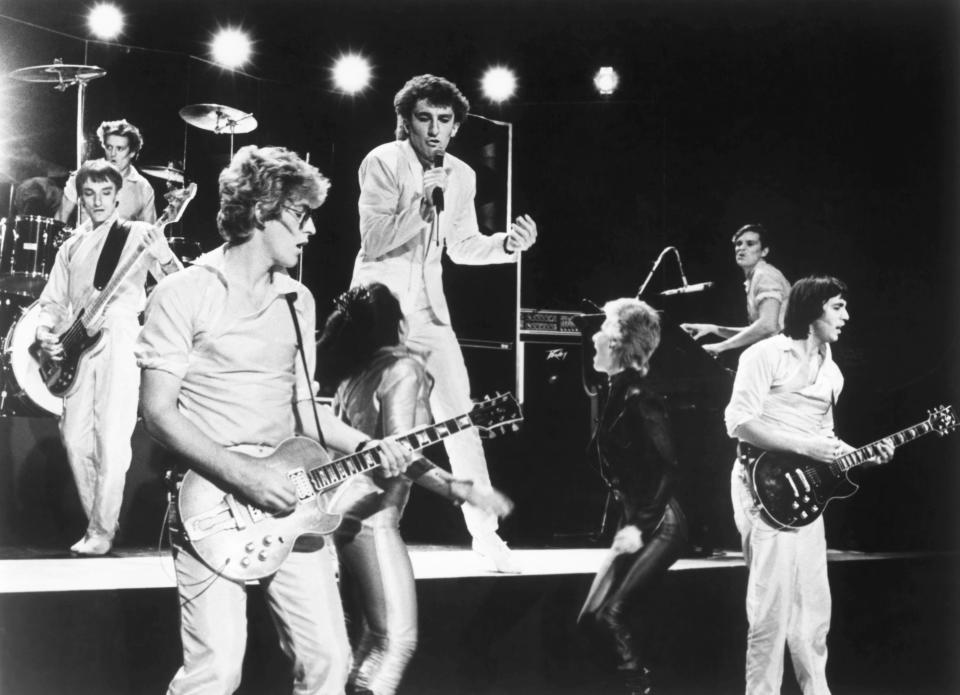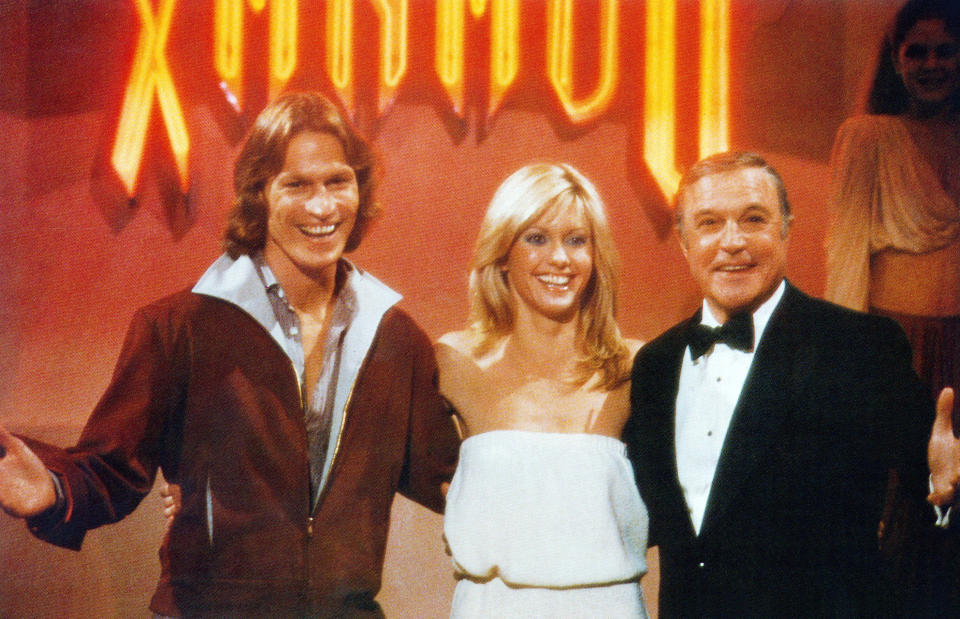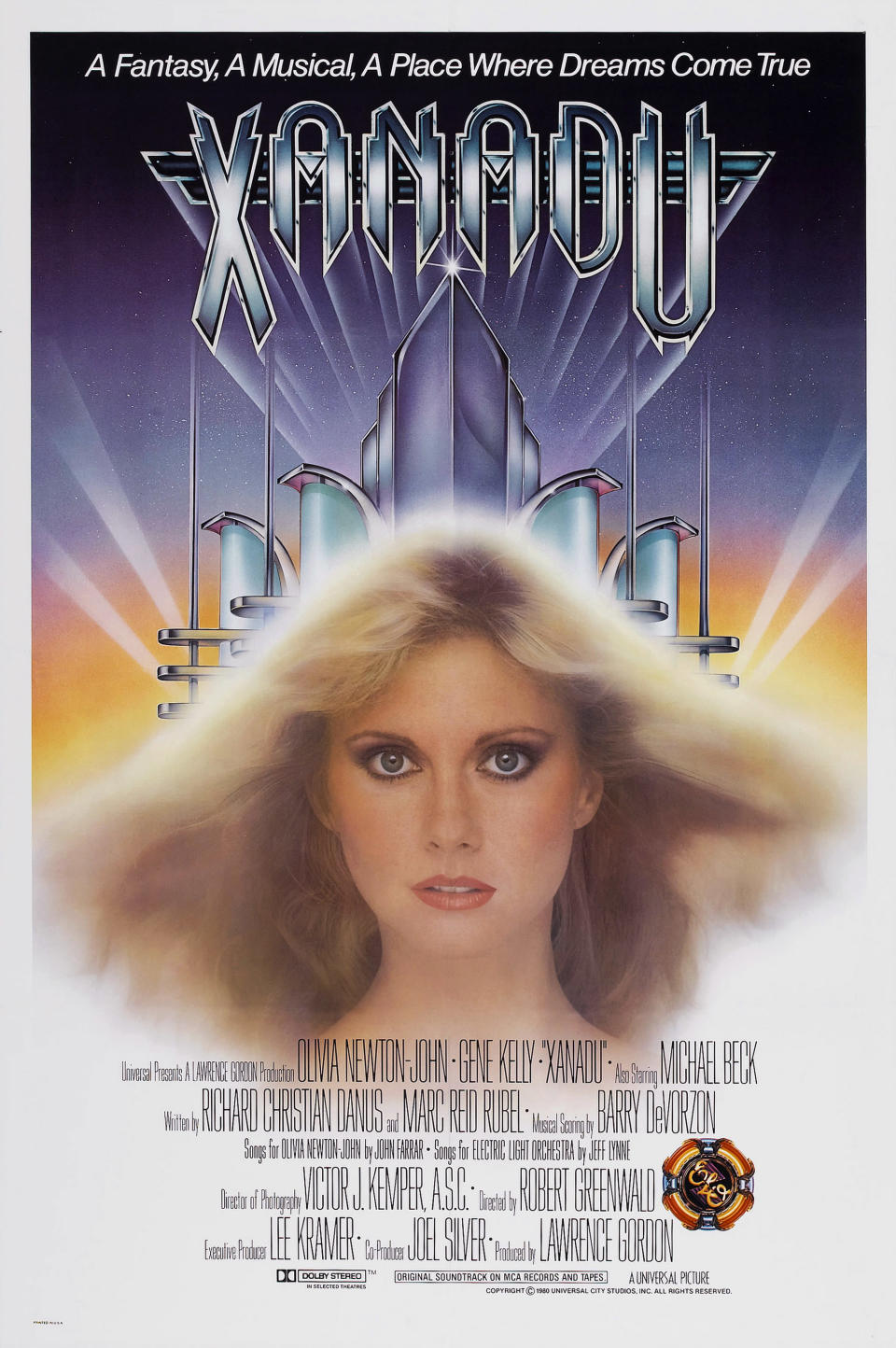The Tubes’ Fee Waybill recalls bonkers 'Xanadu' scene: 'What, are you a disco band now?'
Four decades ago, inspired by a double-feature of two infamous movie musicals — Olivia Newton-John’s Olympian roller-boogie fantasy Xanadu and the Village People’s last-days-of-disco debacle Can’t Stop the Music — entertainment publicist John Wilson held the potluck Oscar party that launched the Golden Raspberry Awards recognizing the very worst in film. The inaugural Razzies took place during a fascinating on-the-cusp age of musical cinema, the late ‘70s/early ‘80s, when hard rock, punk, new wave, glam, disco, and even big-band all merged and mashed — sometimes successfully (Grease, Fame, Pink Floyd’s The Wall), sometimes not much (Sgt. Pepper, The Apple, KISS Meets the Phantom of the Park, Pennies From Heaven, Popeye, and of course, the two above-mentioned flicks).
Xanadu, for what it’s worth, “lost” the Razzie to the Village People (as did Neil Diamond’s even cringey-er nominee, The Jazz Singer). And while Xanadu, about the star-crossed romance between Grecian goddess Kira (Newton-John) and mortal mural painter Sonny (The Warriors’ Michael Beck) was a Xanadon’t, as far as film critics were concerned, its soundtrack, featuring Newton-John and Electric Light Orchestra, was a smash. Now, as the movie celebrates its 40th anniversary this week, one of its key songs and scenes —which completely embodies the era’s decade-straddling, genre-blurring ethos — must be reexamined. And that is “Dancin’,” a bizarre battle of the bands between San Francisco’s theatrical pro-punks the Tubes and an Andrews Sisters-like swing trio — a mashup before the term “mashup” even really existed — while Gene Kelly looks on. (The zany montage featuring Kelly, in his final film role, trying on neon new wave fashions in a hipster boutique is worth a watch as well.)
Yahoo Entertainment recently caught up with Tubes frontman Fee Waybill to discuss the recent cultural reassessment of this misunderstood cult classic. We also discuss how his big Hollywood moment could have derailed the then-underground Tubes’ career (as Sgt. Pepper unfortunately did for Peter Frampton and the Bee Gees), but instead set the band up for MTV success.
Yahoo Entertainment: OK, the first obvious question is, how did you end up in this movie with Olivia Newton-John and Gene Kelly?
Fee Waybill: That was all Kenny Ortega. Kenny Ortega got hired to be the choreographer for the movie. And Kenny was our choreographer...
Wait. Like, the Kenny Ortega, from Michael Jackson, Dirty Dancing, High School Musical, et cetera?
Yes. He started with the Tubes and had been working with us and doing our choreography and theatrical direction for about six or seven years at that point. We met him in San Francisco when he was a young dancer in the regional touring company of Jesus Christ Superstar, wanting to become a choreographer. He was on tour with Jesus Christ Superstar and he saw us in San Francisco and approached us and became friends with one of the guys in the band, and then he proposed the idea to help us kind of put together our show — which was chaos at the time, just a bunch of us trying to figure out what the heck we were doing! He worked for us for 12 or 13 years, and then of course he went on to fame and fortune as a director and choreographer. Kenny’s history is pretty storied.
Back in 1980, Kenny was getting more and more well-known, and he got the Xanadu gig, which was his first choreography film job. And he got us the appearance in the movie. He put that all together — that whole thing with the ‘40 girls, the stages pulling together, the whole song becoming one. That was all Kenny Ortega.

The Tubes really were not a mainstream band at that time. Did you feel any trepidation signing on for a glossy movie like this?
Well, Kenny said we should do it — so we did it! I don't think we ever hesitated. We were like, “Great, let's go!” Everybody was excited about it. It was the first time we had ever done any kind of movie thing like that, and it was so glamorous and there was Olivia Newton-John and Gene Kelly and a big Hollywood studio. We were pretty much in awe the entire time. And Kenny getting to work with Gene Kelly, he was just ridiculously, completely over-the-moon about that.

I know you didn’t write “Dancin’” — that was Olivia’s frequent collaborator, John Farrar. It was definitely a musical departure for the Tubes. What did you think of it?
I thought maybe it was a little too disco for us. I mean, we always used to parody disco! We were not a huge fan of disco and never really were in that genre. But it was very hooky and it had a great chorus. I think we pulled it off better than we expected to. … Our fans, of course, didn't like it at all at the time. They thought we were crazy: “What, are you a disco band now?” At the time, we were a cult band, a new-age kind of punk band. We had never had any commercial success. We had never had any big-time radio. We hadn't released [the breakthrough album] The Completion Backwards Principle yet. I mean, people shot us down doing that record too, saying, “Oh my God, now they're selling out! They're having a hit on the radio!” So yeah, our fans were not crazy about the whole idea of Xanadu at all.
Did you ever do “Dancin’” concert, and if so, how did it go over?
We actually have never performed the song, ever. People have requested it over the years, and a number of times we actually learned the song and tried to fit it into one of our Tubes shows, but we never figured out a spot for it. So we've never, ever done it live, funny enough, after all this time. You'd think we would have. … But you know, after we did Xanadu in 1980, we didn't hear about it for years. It wasn't until years later that it started becoming more and more popular and people started emailing us and asking us, “When are you going to do some ‘Dancin’’ in your show?” It's funny how cult stuff works. You never know what is going to come back around.
Well, let’s talk about the one time you did perform it, lip-synching on the Xandau set.
We did that whole scene in two days. We went in the studio and recorded the track, and then the next day we put the whole thing together and maybe a couple of days later, they had to figure out how to build this whole set on rollers, so it would slide together. It was a whirlwind. I wasn't sure that it was going to work, but that's proof that John Farrar was really brilliant. We actually didn't really realize at the beginning, when we were recording it, that it was going mash up with that other kind of Andrews Sisters song. It was all news to us! But it fit so perfectly, it was undeniable. Those two songs just melted together.
Wait. Are you saying that you didn’t know until after you recorded “Dancin’” that your recording was only part of the scene and song? You didn’t know about the big-band section?
No, we found out after the fact, when they were doing the playback, when we were filming it. They put it together towards the end of the track, when the two songs started to merge together, and we went, “Wow, are you kidding?” And we didn't know the stages were going to merge together like that. I think the first time we realized what was going to happen was when we were on set and realized, “Oh my God, they're going to play both songs at the same time!” Like I said, it was a revelation to us. But, like I said, it worked.

What else do you remember from the shoot?
That they wanted us to wear those orange suits. I wasn't crazy about that idea, although it looked great. They were like nylon, and it was so hot. I just remember being unbelievably hot with the lights; it was brutal. We rehearsed quite a long time for it, because the stage was moving from platform to platform — not platform shoes, but actual platforms [laughs] — and it was all about the camera angles. It was this three-minute song, and it probably took us two days of camera angles and lighting and construction and rehearsal, just to get those three minutes. It was grueling, because we had never done anything like that before. We didn't know what the heck was going on. But whatever Kenny said, we did. We had so much confidence in his ability.
But then… the reviews came out. And the Razzies happened. Do you have any idea why this film was so panned? A lot of people consider it to be one of the worst movies of all time, although the tides have turned in recent years.
I actually don't remember it being that badly reviewed! But you know, it was kind of a post-disco kind of time, so maybe everyone thought it was a little bit old news by 1980.
So you think Xanadu came out too late?
Maybe. Or maybe it was too early. There was no real outlet for it. This was exactly one year before MTV — 1981 was when MTV started, and the whole musical world became more visual. Everybody was expected to make a video and look good and do something interesting. It was a huge turning point in the world of music and film, where the visual aspect of rock ‘n’ roll just became so much more important and the way to advertise and monetize your career. Maybe if MTV had been around and had cut up clips of Gene Kelly dance numbers or Olivia or ELO, it could have made a difference. Olivia was gorgeous, and it was Gene Kelly’s last movie and he was still very, very vital. I think MTV would have been a huge plus, to have been able to advertise that movie.

Ironically, the Tubes eventually became big stars because of MTV.
Yes, MTV huge for us. But we had been doing video stuff for so long, like over the previous four or five years. The Tubes had always incorporated video in our show. We went out on our that 1979 tour for the Remote Control album with big video screens and televisions and all this prerecorded video. So it was kind of easy for us to transition.
But were you worried that the failure of Xanadu would ruin your career, in 1980?
Well, that was a big year for us. We signed to Capitol Records and that kind of changed our whole career — that coupled with us doing the record with David Foster, The Completion Backwards Principle, and having hits with “Don't Want to Wait Anymore” and “Talk to Ya Later,” it all kind of changed for us that year. We were in the studio at the time that Xanadu came out — like, right after that, we started to work with David Foster — and we were really busy, so we didn't have time to worry about it. By the time we realized [that Xanadu had flopped], the movie had pretty much come and gone.

So looking back on the legacy of Xanadu, 40 years later, what are your thoughts?
I think it was transformational, especially for Kenny. It was the first movie he ever choreographed and the last movie that Gene Kelly ever did, so it kind of was the beginning and the end, for a lot of people. But I think it was more of a beginning than an end. It was our first movie, and our first glimpse of Hollywood. I like the fact that over the years it's become so popular and such a cult favorite. It really deserves that. It was so real. It was so authentic. It didn't try to be something it wasn't. And the songs were great. So even though the initial critical reaction was bad, I'm happy with the way it turned out, all these years later. I think it's like the second-biggest cult film ever, behind The Rocky Horror Picture Show — something like that. So I think it's so cool to have been a part of it.
Read more from Yahoo Entertainment:
In praise of feminist icon Stephanie Zinone, or why ‘Grease 2’ is better than ‘Grease’
Nigel Lythgoe on his disco cult movie, ‘The Apple’: ‘The best part of making it was finishing it’
David Foster opens up about Ben Vereen car accident, Kat McPhee marriage and superstar career
40 years ago, Aerosmith kicked ass in 'Sgt. Pepper's Lonely Hearts Club Band'
KISS revisits 'Phantom of the Park,' 40 years later — 'Wow, that was weird'
Debbie Allen recalls the grittiness of ‘Fame,’ 40 years later: ‘It was not a Disney movie’
Follow Lyndsey on Facebook, Twitter, Instagram, Amazon and Spotify


